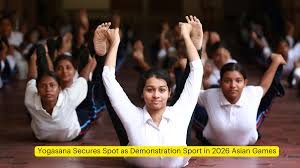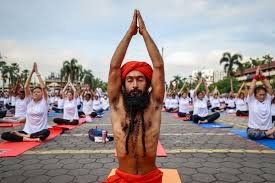Yogasana Secures Spot as Demonstration Sport in 2026 Asian Games
Introduction to Yogasana’s Inclusion
In a landmark decision for the world of sports and wellness, Yogasana has been confirmed as a demonstration sport at the 2026 Asian Games. This announcement marks a significant moment for both traditional and modern sports communities, reflecting the growing global appreciation for Yoga as not only a practice for well-being but also a structured sport.
Significance of Yogasana’s Recognition
Yogasana’s inclusion as a demonstration sport is a recognition of its historical and cultural importance. The Asian Games, one of the continent’s largest sporting events, provides a prestigious platform to showcase Yogasana’s disciplined practice and competitive aspects. This move is expected to enhance the visibility of Yoga, encouraging greater participation and understanding of its principles and techniques.
The Path to Demonstration Status
The journey to becoming a demonstration sport involved several stages of evaluation and endorsement. Yogasana’s inclusion follows extensive advocacy from Yoga organizations and enthusiasts who highlighted its benefits, including improved flexibility, strength, and mental focus. The decision reflects the growing trend of integrating traditional practices into modern sporting events, showcasing their relevance in contemporary times.
Expected Impact on Asian Games
The inclusion of Yogasana in the Asian Games is anticipated to have a multi-faceted impact. Athletes from various countries will have the opportunity to engage with this ancient practice, promoting cross-cultural exchanges and deeper understanding. Additionally, it will spotlight Yoga’s contributions to physical fitness and mental health, potentially influencing other sporting events to recognize similar disciplines.
Future Prospects and Developments
Looking ahead, the inclusion of Yogasana as a demonstration sport opens up opportunities for its further development and integration into major sporting events. The demonstration will serve as a testbed for evaluating its reception and feasibility as a full-fledged competition in future editions of the Games. This step is a promising sign for Yoga practitioners and advocates around the world.

Why This News is Important
Cultural Significance
The inclusion of Yogasana as a demonstration sport in the 2026 Asian Games underscores the global recognition of Yoga’s cultural and historical significance. Yoga, an ancient practice with roots in Indian tradition, is now being acknowledged on a prestigious international stage. This recognition not only honors its origins but also promotes a deeper appreciation of its holistic benefits.
Promoting Traditional Practices
By featuring Yogasana in the Asian Games, the event embraces and celebrates traditional practices alongside contemporary sports. This move encourages the integration of diverse cultural practices into modern sporting events, fostering greater respect and understanding among nations. It highlights the value of preserving and showcasing traditional sports in a global context.
Enhancing Global Awareness
Yogasana’s inclusion as a demonstration sport will significantly enhance global awareness of Yoga. Athletes and spectators from various countries will gain insight into this ancient practice, potentially leading to increased participation and interest. This broader exposure could lead to more widespread adoption of Yoga practices worldwide.
Encouraging Physical and Mental Wellness
Yoga is renowned for its physical and mental health benefits. By including Yogasana in a major sporting event, there is an opportunity to emphasize these benefits on a global platform. This could inspire more individuals to engage in Yoga, contributing to improved physical fitness and mental well-being across diverse populations.
Impact on Future Sporting Events
The demonstration of Yogasana at the Asian Games sets a precedent for the inclusion of other traditional or non-mainstream sports in major international events. This move could pave the way for similar practices to be recognized, promoting a more inclusive and varied sporting landscape in the future.
Historical Context: Background of Yogasana
Yogasana, the practice of physical postures in Yoga, has ancient origins in India, dating back thousands of years. Traditionally, it was practiced as part of a holistic approach to health and spiritual development. Over the centuries, Yogasana has evolved and gained recognition beyond its traditional roots, becoming popular worldwide.
The practice involves a series of postures and exercises designed to improve flexibility, strength, and balance. In recent decades, Yoga has seen a resurgence in global popularity, with various styles and practices being adapted for different purposes, including competitive sports. The decision to include Yogasana as a demonstration sport reflects this global trend and acknowledges its relevance in contemporary sporting contexts.
Key Takeaways from Yogasana’s Inclusion
| Serial Number | Key Takeaway |
|---|---|
| 1 | Yogasana has been officially recognized as a demonstration sport at the 2026 Asian Games. |
| 2 | This recognition highlights the global appreciation for Yoga’s physical and mental health benefits. |
| 3 | The inclusion promotes the integration of traditional practices into modern sporting events. |
| 4 | The demonstration will provide an opportunity for international exposure and understanding of Yogasana. |
| 5 | This move could influence future sporting events to include similar traditional or non-mainstream sports. |
Important FAQs for Students from this News
1. What is Yogasana and why is it significant?
Yogasana refers to the practice of physical postures in Yoga. It is significant due to its historical roots in India, its benefits for physical and mental health, and its increasing global recognition. The practice aims to improve flexibility, strength, and mental focus.
2. What does it mean for Yogasana to be included as a demonstration sport in the 2026 Asian Games?
Being included as a demonstration sport means that Yogasana will be showcased during the 2026 Asian Games, but it will not be a medal event. This inclusion provides a platform to highlight and promote the practice to a broader audience.
3. How does Yogasana’s inclusion impact its global visibility?
Yogasana’s inclusion enhances its global visibility by introducing it to an international audience through a major sporting event. This exposure could lead to increased interest and participation in Yogasana worldwide.
4. What are the benefits of including traditional practices like Yogasana in modern sporting events?
Including traditional practices like Yogasana in modern sporting events helps preserve cultural heritage, promotes diverse sports, and encourages global understanding of different practices. It also provides opportunities for traditional sports to gain recognition and appreciation.
5. How can the inclusion of Yogasana influence future sporting events?
The inclusion of Yogasana could pave the way for other traditional or non-mainstream sports to be recognized in major international events. This could lead to a more inclusive and varied sporting landscape in future editions of such events.
Some Important Current Affairs Links

















